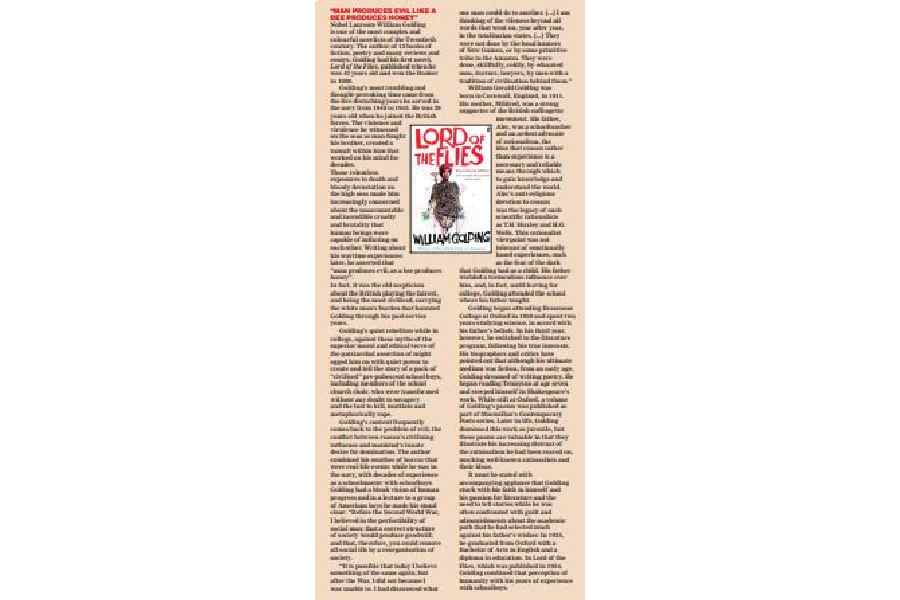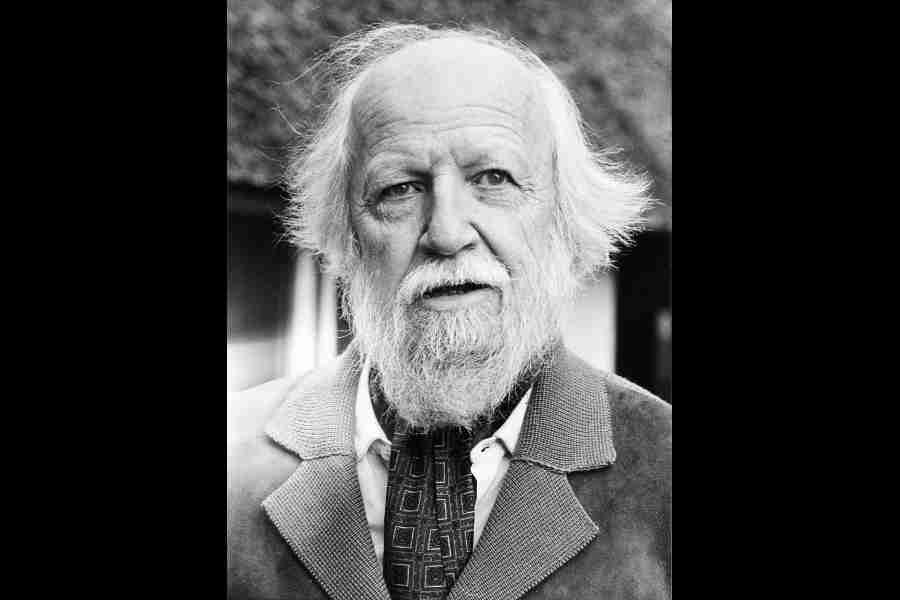For the first time since its publication in 1954, William Golding’s Lord of the Flies, one of the most controversial works of fiction, is on the brink of being turned into a television series. It will be made by BBC in four hour-long episodes. Fiesty and sharpshooting novelist Golding’s popular work has been adapted to the big screen in the past, although never for TV.
Written in the years following World War II and the first use of atom bombs, the story is beguilingly simple in the beginning. With fears of a nuclear war, a planeload of pre-pubescent English schoolboys are in the process of shifting to a safer destination. However, the plane crashes into an idyllic island killing all the elders and leaving the children to their own devices.
Now, the paradise, which was pristine is blighted with the presence of some of the boys, like Jack, a redheaded choir leader, who demonstrates a horrific stomach for butchery and despotism. There is almost an immediate fissure in the group with Ralph representing a middle-of-the-road, calm boy with leadership qualities, but who lacks vision and loyalty.
Jack is the scrawny, indomitable male powerhead who spews threats and aggression and wants to possess the island and all the boys. He is Golding’s master characterisation of all that is the worst of human ID — what Freud explained as the baser instincts and engulfed irrational hunger and greed and lust.
The boy with asthma who wears glasses, Piggy, is a manifestation of the Superego, or compassion and wisdom, and constantly reminds the group about being civilised, orderly and democratic, but is ignored. But the bloodthirsty Jack creates fear, with the distinction of being the planner and executor of two murders — of Simon, a Christlike figure, and Piggy.
There is the awful act of the killing of a mother pig who is feeding her piglets, and the debauchery and mutilation of her genitals which is carried out by Jack and his hunter cohort, co-led by Roger, another member of the school chorus who have learnt Catholic hymns since they went to school, but now resort to the mantra: “Kill the pig, Slit her throat, Bash her in”, with lusty voices. Roger’s cry for inserting the sharpened stick “right up her ass” is a shout that echoes through the pristine forest, a trope for Nature as Mother, with monstrous depravity.
Today, almost 70 years after its publication, the story still resonates and remains relevant in our history of colonialism, oppression, slavery and genocide. After the publication of the novel, William Golding himself said: “It was simply what seemed sensible for me to write after the War when everyone was thanking God they weren’t Nazis. I’d seen enough to realise that every single one of us could be Nazis.”

BBC’s announcement has caused much excitement among Golding enthusiasts. The show will air on BBC One and play on BBC iPlayer.
Lord of the Flies first got splashed onto the big screen first in 1963 by the iconic director Peter Brook (of the nine-hour The Mahabharata fame). He had explained why he turned the novel into a film: “I believed that the reason for translating Golding’s very complete masterpiece into another form in the first place was that although cinema lessens the magic, it introduces evidence.”
He says that the book is a beautiful fable, “so beautiful that it can be refuted as a trick of compelling poetic style”. In the film, no one can attribute the looks and gestures to tricks of direction. The violent gestures, the look of greed, and the faces of experience are all real.
“People always ask whether the children understood, and what effect it had on them. Many of their off-screen relationships completely paralleled the story. Even the wise and calm Piggy came to me one day, close to tears. ‘They’re going to drop a stone on you,’ the other boys had been telling him. ‘That scene on the schedule, Piggy’s death, it’s for real. They don’t need you anymore.’”
‘My experience showed me that the only falsification in Golding’s fable is the length of time the descent to savagery takes. His action takes about three months. I believe that if the cork of continued adult presence were removed from the bottle, complete catastrophe could occur within one long weekend,” Brook opined.
Nearly 30 years later, it was adapted for the screen once again in 1990 by Harry Hook, which became the more recognised of the two films. Since 2020, a third film adaptation, this one by Luca Guagdino, is in the works.
For the newest manifestation of the novel, in the television series, Bafta awardee Jack Thorne will be executive producer, collaborating with BBC’s Nawal Faizullah, and Eleven’s Jamie Campbell Joel Wilson. The show is an Eleven production and supported and backed by Sony Pictures Television.
Not much of the main creative roles nor the casting is quite through yet, However, with scriptwriter Thorne — who has previously worked on page-to-screen adaptations — in place, it seems to be off to a good start. He is known for his work on HBO’s His Dark Materials, a three-season show based on the Philip Pullman book trilogy. Thorne has also found success with adapted projects such as Wonder, The Secret Garden (2020), and Enola Holmes.
The multi-layered approach that William Golding has left his readers, to wonder whether Lord of the Flies lends itself to an ecocritical reading, a Postcolonial reading, a feminist reading or a psychoanalytical reading, one thing is for sure — this novel continues to lend itself to adaptations in a multiplicity of genres.
“I am an eternal optimist. There is a nobility in Simon and though he may be killed, he will still climb the mountain,” said Golding. And because of the way Lord of the Flies is ever relevant, Golding will always get a new moulding.

Julie Banerjee Mehta is an author of Dance of Life and co-author of the bestselling biography Strongman: The Extraordinary Life of Hun Sen. She has a PhD in English and South Asian Studies from the University of Toronto, where she taught World Literature and Postcolonial Literature for many years. She currently lives in Calcutta and teaches Masters English at Loreto College
